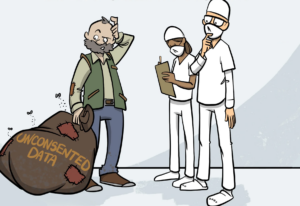The programmatic supply chain is a confusing, murky and complex mess. That’s not news.
Media and marketing consultancy Ebiquity recently analyzed $7 billion of digital ad spend among its clients and found that almost 20% of it – nearly $1.5 billion – got gobbled up before publishers could see a dime.
Why do advertisers put up with this?
Studies have shined a light on the overall lack of transparency. ISBA’s eye-opening 2020 report, which found that publishers receive an average of just 51% of advertising spend … and that 15% of ad spend can’t be attributed at all. These investigations have prompted initiatives to clean up the supply chain.
But it’s hard to understand why advertisers don’t rebel even more. Their bias toward inaction isn’t all that surprising when one considers FOFO, says Ruben Schreurs, Ebiquity’s chief product officer, on this week’s episode of AdExchanger Talks.
No, not FOMO. Whereas some people are afraid of missing out, many advertisers suffer from a “fear of finding out.”
Having the “sorry, we were spending 20% of our budget on waste for years” conversation with your boss is no fun. Better not to know. Well, not better, but plausible deniability is not usually a fireable offense.
“Some companies are more progressive than others, and some individuals are less susceptible to that FOFO,” Schreurs says. “But yeah, it’s a real issue.”
Also in this episode: The importance of supporting quality news journalism, pondering the great mystery of why legitimate publishers persist in using content recommendation widgets, what it was like to buy bitcoin when it was just $8 and why the industry needs a new term to use when talking about the open web. (We even coin one on this episode).
For more articles featuring Ruben Schreurs, click here.














